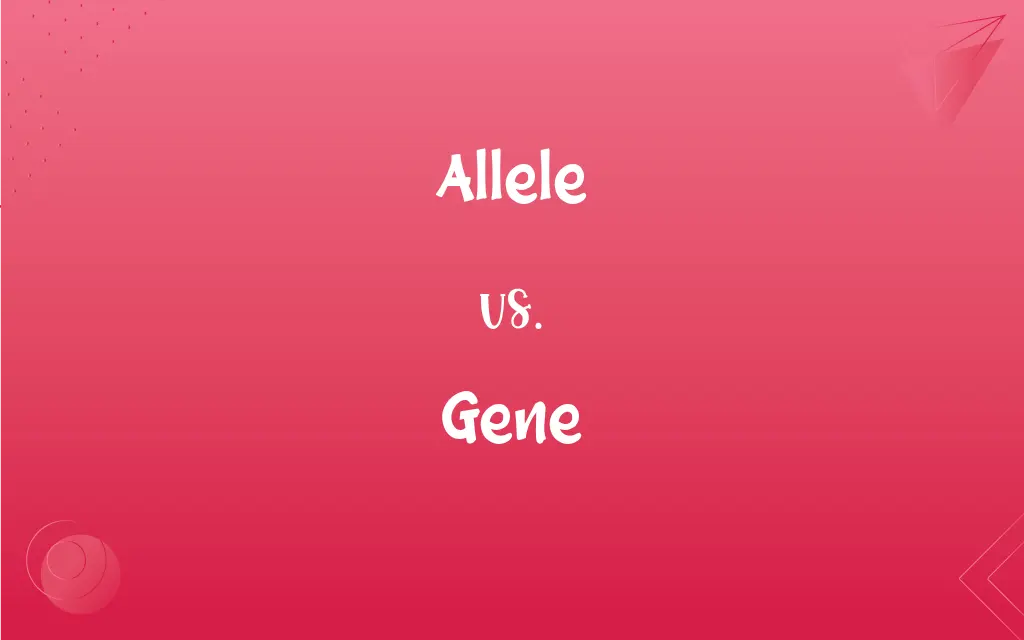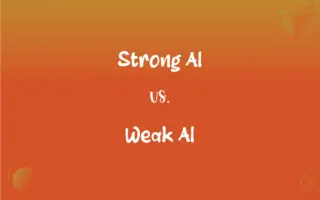Allele vs. Gene: What's the Difference?
Edited by Janet White || By Harlon Moss || Updated on October 13, 2023
An "allele" is a variant form of a gene. They are related but distinct concepts in genetics. A "gene" is a segment of DNA that codes for a particular trait.

Key Differences
In the realm of genetics, the words "gene" and "allele" are employed to articulate distinctive aspects of heredity and variation. A gene represents a segment of DNA that encodes a particular trait, acting as a blueprint for constructing proteins crucial for the organism's form and function. Conversely, an allele constitutes a variant of a gene, existing as one of the multiple forms a gene can take. Essentially, while genes are foundational in determining traits, alleles contribute to the variations witnessed in those traits among individuals.
The relationship between a gene and an allele can be illuminated through an analogy to language. If one considers a gene as a word, an allele might be likened to different spellings or versions of that word. A gene governs a particular characteristic of an organism, like eye color or blood type. Meanwhile, alleles are akin to the various spellings (or versions) that give rise to the different manifestations of that characteristic, such as blue, brown, or green eyes.
Genes occupy a specific locus (position) on a chromosome and dictate the structures of proteins and thereby, traits. This singular locus on a chromosome is crucial for specifying a particular characteristic. Alleles, on the other hand, bring variability into the genetic picture, ensuring that populations can exhibit diversity in their expressions of a given trait. Thus, the specificity of a gene’s locus contrasts with the variability introduced by alleles.
Moreover, genes and alleles interact in fascinating ways to produce the myriad expressions of traits witnessed within populations. A gene may be presented in various forms (alleles) which, when expressed, might exhibit dominance or recessivity in phenotypic expression. Alleles, being variations, interact with the environment and other genes to manifest physical properties (phenotype), thus driving evolutionary processes by providing a pool of genetic diversity.
Understanding the meticulous dance between genes and alleles opens windows into comprehending the complexities of heredity, variability, and evolution. The steadfastness of a gene in governing a trait is tempered by the variability of alleles, which ensure that traits can be manifested in multiple ways, enriching the tapestry of life with diverse forms, abilities, and adaptations.
ADVERTISEMENT
Comparison Chart
Basic Definition
A segment of DNA coding for a specific trait
One of the variant forms of a gene
Role
Dictates specific traits
Provides variations of a trait
Position
Has a specific locus on a chromosome
Is a variant occurring at a gene's locus
Contribution to Traits
Determines the basic framework of a trait
Influences variations in trait expression
Relation to Variation
Does not vary within an individual
Can exhibit different forms within a population
ADVERTISEMENT
Allele and Gene Definitions
Allele
Alleles can be dominant or recessive, influencing the expressed physical trait.
The allele for brown eyes is dominant over the allele for blue eyes in humans.
Gene
A gene is a unit of heredity in an organism, encoded in DNA.
The gene responsible for red hair is recessive, meaning both parents must carry it for their child to have red hair.
Allele
An allele is one of two or more versions of a gene found at the same place on a chromosome.
Blue eye color in humans is determined by a particular allele of the eye color gene.
Gene
Genes provide instructions for making proteins, which dictate an organism's traits.
The gene for producing insulin is critical for regulating blood sugar levels in humans.
Allele
Alleles are variants that can cause different phenotypic outcomes of a particular trait.
The allele for purple flowers in peas is dominant over the allele for white flowers.
Gene
Genes can exhibit multiple forms called alleles, influencing the variation of a trait.
The gene for flower color in peas has both purple and white color alleles.
Allele
Alleles contribute to the genetic diversity within a population.
Various alleles for a gene create a range of hair colors in a population.
Gene
Genes are located on chromosomes and have specific positions known as loci.
The gene determining eye color has a specific location on a particular chromosome.
Allele
Homozygous alleles are identical pairs, heterozygous alleles are different.
Having two alleles for tall height in peas makes the plant homozygous for that trait.
Gene
Through genes, traits can be passed from parents to offspring.
A child might inherit a height gene variant from a tall parent.
Allele
Any of the alternative forms of a gene or other homologous DNA sequence. Also called allelomorph.
Gene
A hereditary unit consisting of a sequence of DNA that occupies a specific location on a chromosome and is transcribed into an RNA molecule that may function directly or be translated into an amino acid chain. Genes undergo mutation when their DNA sequences change.
Allele
(genetics) One of a number of alternative forms of the same gene occupying a given position, or locus, on a chromosome.
Gene
(genetics) A theoretical unit of heredity of living organisms; a gene may take several values and in principle predetermines a precise trait of an organism's form (phenotype), such as hair color.
Allele
One of two or more alternative forms of a gene that can have the same place on homologous chromosomes and are responsible for alternative traits.
Gene
(molecular biology) A segment of DNA or RNA from a cell's or an organism's genome, that may take several forms and thus parameterizes a phenomenon, in general the structure of a protein; locus.
A change in a gene is reflected in the protein or RNA molecule that it codes for.
Allele
Either of a pair of Mendelian characters that may occur in an organism as a consequence of variation at one gene locus.
Gene
(genetics) a segment of DNA that is involved in producing a polypeptide chain; it can include regions preceding and following the coding DNA as well as introns between the exons; it is considered a unit of heredity;
Genes were formerly called factors
Allele
One of two alternate forms of a gene that can have the same locus on homologous chromosomes and are responsible for alternative traits;
Some alleles are dominant over others
FAQs
Can a gene have multiple alleles?
Yes, a gene can have several alleles, leading to variations in a trait.
Are genes always located in the same place on a chromosome?
Yes, each gene has a specific position or locus on a chromosome.
Do alleles change the basic function of a gene?
No, alleles represent variations in a gene, not changes to its basic function.
How do genes contribute to an organism's traits?
Genes provide the instructions for making proteins, which in turn determine an organism's traits.
Can two alleles for a gene be identical?
Yes, if both alleles are the same, the individual is said to be homozygous for that gene.
Are all alleles equally common in a population?
No, some alleles can be rare while others can be more prevalent, based on evolutionary pressures and other factors.
How many genes does a human have?
Humans have approximately 20,000-25,000 genes.
How is the function of a gene determined?
By studying the protein it codes for and observing the resulting trait or function in an organism.
What is a gene in simple terms?
A gene is a segment of DNA that provides instructions for a specific trait in an organism.
How do genes and alleles play a role in inheritance?
Genes determine traits, and alleles contribute to the variation of those traits, which are passed from parents to offspring.
What determines if an allele is dominant or recessive?
Dominance and recessiveness are determined by how alleles interact to produce observable traits.
How do genes relate to chromosomes?
Genes are segments located on chromosomes, which are long threads of DNA.
How does an allele relate to a gene?
An allele is a variant or version of a gene.
Are genes only found in DNA?
Primarily, yes, genes are segments of DNA, but some viruses have genes in RNA.
How do scientists identify different alleles for a gene?
Through techniques like DNA sequencing, which can reveal variations in gene segments.
Why is understanding genes and alleles important?
It helps in understanding heredity, variation, evolution, and can have applications in medicine and biotechnology.
Can two genes occupy the same locus on a chromosome?
No, each gene has a specific and unique locus on a chromosome.
Can the environment influence gene and allele expression?
Yes, environmental factors can influence how genes and alleles are expressed in an organism.
Can alleles be created or destroyed?
New alleles can arise through mutations, but they can't be "destroyed" in the conventional sense, though they can become rare or lost in populations.
What's the difference between a gene and a genome?
A gene is a segment of DNA coding for a trait, while a genome is the entire set of DNA in an organism.
About Author
Written by
Harlon MossHarlon is a seasoned quality moderator and accomplished content writer for Difference Wiki. An alumnus of the prestigious University of California, he earned his degree in Computer Science. Leveraging his academic background, Harlon brings a meticulous and informed perspective to his work, ensuring content accuracy and excellence.
Edited by
Janet WhiteJanet White has been an esteemed writer and blogger for Difference Wiki. Holding a Master's degree in Science and Medical Journalism from the prestigious Boston University, she has consistently demonstrated her expertise and passion for her field. When she's not immersed in her work, Janet relishes her time exercising, delving into a good book, and cherishing moments with friends and family.































































